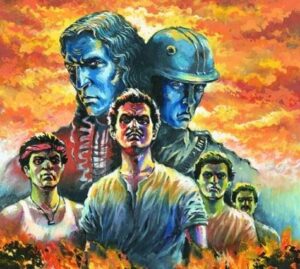“The Power of Protest: Nildarpan’s Role in Bengali Theatre”
Nildarpan, written by Dinabandhu Mitra in 1860, is a landmark Bengali play that boldly exposed the brutal exploitation of Indian farmers by British indigo planters. Set against the backdrop of colonial Bengal, the play uses vivid realism and emotional depth to portray the suffering of peasants forced into indigo cultivation. As one of the earliest examples of political theatre in India, Nildarpan not only ignited public consciousness but also laid the foundation for socially engaged drama in Bengali literature. Its legacy continues to inspire conversations around resistance, justice, and the power of storytelling on stage.
🧵 1. Colonial Oppression and Exploitation
At its core, Nildarpan exposes the brutal treatment of indigo farmers under British planters. The play vividly portrays how peasants were coerced into cultivating indigo under exploitative contracts, often facing violence and economic ruin.
🗣️ 2. Voice of the Voiceless
The drama gives a platform to the marginalized—especially the rural poor—whose suffering had long been ignored. Through characters like Ratan and Nandlal, the play channels the collective anguish and resistance of the oppressed.
🔥 3. Protest and Resistance
Nildarpan is not just a narrative—it’s a call to action. It celebrates the courage of farmers who dared to defy colonial authority, making it one of the earliest examples of political protest in Indian theatre.
🤝 4. Solidarity and Community
The play emphasizes the strength found in unity. The farmers’ collective struggle against injustice highlights the importance of community support in the face of systemic oppression.
🎭 5. Realism in Theatre
Departing from mythological or romantic themes, Nildarpan introduced social realism to Bengali drama. It used everyday language and relatable characters to reflect real societal issues, marking a turning point in Indian theatrical tradition





